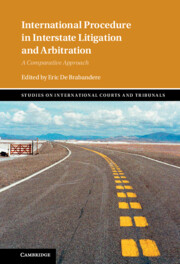Book contents
- International Procedure in Interstate Litigation and Arbitration
- Studies on International Courts and Tribunals
- International Procedure in Interstate Litigation and Arbitration
- Copyright page
- Contents
- Contributors
- Introduction
- Part I Pre-hearing and Selection and Appointment of Judges and Arbitrators
- 1 Registries and Secretariats of Interstate Dispute Settlement Authorities
- 2 Judicial Independence at International Courts and Tribunals
- 3 Designing for the Best Composition of International Courts
- 4 The Role of the Judge ad hoc in Interstate Litigation
- Part II Post-commencement Litigation Procedure and Strategy
- Part III Evidence and Witness
- Part IV Post-hearing and Effect of Decisions
- Index
2 - Judicial Independence at International Courts and Tribunals
Lessons Drawn from the Experiences of the International Court of Justice and the Appellate Body of the World Trade Organization
from Part I - Pre-hearing and Selection and Appointment of Judges and Arbitrators
Published online by Cambridge University Press: 18 November 2021
- International Procedure in Interstate Litigation and Arbitration
- Studies on International Courts and Tribunals
- International Procedure in Interstate Litigation and Arbitration
- Copyright page
- Contents
- Contributors
- Introduction
- Part I Pre-hearing and Selection and Appointment of Judges and Arbitrators
- 1 Registries and Secretariats of Interstate Dispute Settlement Authorities
- 2 Judicial Independence at International Courts and Tribunals
- 3 Designing for the Best Composition of International Courts
- 4 The Role of the Judge ad hoc in Interstate Litigation
- Part II Post-commencement Litigation Procedure and Strategy
- Part III Evidence and Witness
- Part IV Post-hearing and Effect of Decisions
- Index
Summary
Comparing and contrasting the ICJ and the Appellate Body of the World Trade Organization, I assess whether those international judicial mechanisms possess the basic degree of independence required for a court to be able to maintain its credibility so that it can continue to perform its core function of adjudicating interstate disputes. With those two interstate adjudicative bodies constituting the two leading international courts in terms of participation and the sheer number of cases decided, much may be learned from comparing them. I start by considering what the concept of judicial independence means in general and how it can specifically be assessed. The chapter then considers whether the ICJ and AB possess the basic degree of independence necessary to properly discharge the judicial function. In pointing out that real deficits exist, I argue there is a case for bolstering the independence of the ICJ; and without immediate reforms to the AB’s institutional design, its potential demise is likely to be hastened. I conclude that if a basic degree of judicial independence cannot be guaranteed, it is preferable to let a court vanish for a while than to maintain a significantly deficient one.
- Type
- Chapter
- Information
- International Procedure in Interstate Litigation and ArbitrationA Comparative Approach, pp. 51 - 88Publisher: Cambridge University PressPrint publication year: 2021

